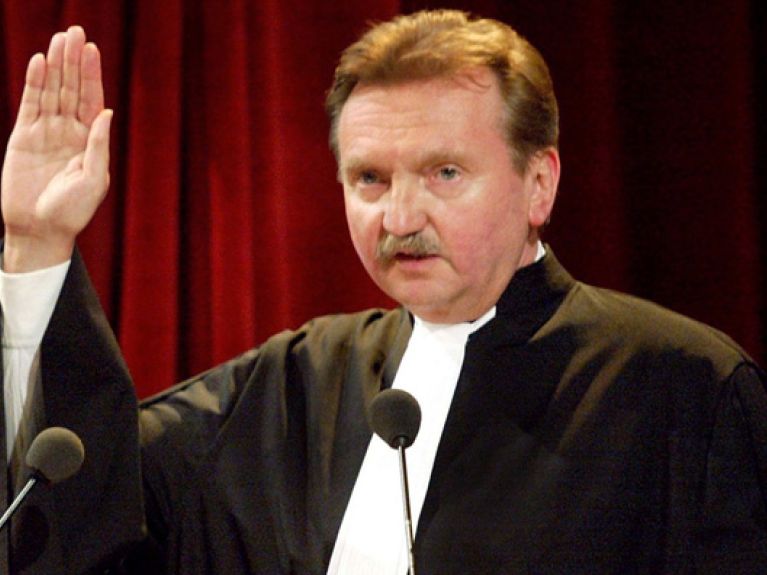Hans-Peter Kaul, Judge at the International Criminal Court in The Hague, in an interview with DE
The judge, who is one of the key representatives in favour of establishing an International Criminal Court, talks about the court’s work.

Mr. Kaul, you strongly championed the establishment of the International Criminal Court (ICC) for many years. What was your motive for that?
I was and am convinced that the establishment of a world criminal court for the most serious crimes of humankind is also a consequence of the crimes of National Socialism and their condemnation in the Nuremberg Trials. However, the crimes of the Nazis were by no means the end: we have had to observe genocide in Cambodia, genocide in Halabja in Iraq, in Srebrenica in Bosnia, and in Rwanda – and it always threatened to go unpunished! Much too little respect has been and is paid to international law and human rights. That’s why I wanted to do absolutely everything to realize the idea of the International Criminal Court.
The ICC commenced work in 2002. What has it accomplished so far?
In 2002 there was only a piece of paper: the Rome Statute. We have built up a fully functioning global criminal court from scratch. We have initiated criminal prosecutions against some 30 international leading perpetrators. I am fully aware of the criticism that so far only two cases have been concluded. We had to acquit the Congolese militia leader Mathieu Ngudjolo Chui due to lack of evidence – as happens in courts subject to the rule of law. The Congolese Thomas Lubanga received a 14-year prison sentence for the large-scale recruitment of child soldiers. In 2005 the International Criminal Court issued an arrest warrant for Joseph Kony; long before an American NGO drew worldwide attention to the case of the Ugandan rebel leader in 2012. As a result of the ICC arrest warrant, Kony’s troops stopped recruiting and there were mass desertions. Politically, Joseph Kony has become insignificant. I find it extremely frustrating that he has not yet been apprehended. However, the example shows that, irrespective of the number of cases handled, the intervention of the ICC has a conflict-calming effect. Throughout the world, the ICC acronym has become a symbol that crimes against humanity will not be allowed to go unpunished.
Where is action required?
Of course, the ICC needs more than 122 states parties. That may already be a very substantial number, but the United Nations has 193 members. And we need more practical and financial help. On the one hand, there is the expectation that the ICC should dispense justice worldwide, while, on the other, the financial support has failed to materialize. We need assistance from as many states as possible with arrests, for example by special operations units, with the furnishing of evidence and with the freezing of accounts. The Congolese warlord Jean-Pierre Bemba, whose assets are estimated by international observers to be worth 400 million dollars, receives legal aid for his case before the ICC. And that is only because we have been unable to identify his accounts.
From 2017 the ICC will also take action against “crimes of aggression”, which were recently integrated into the Rome Statute. Why is this enhancement important?
The aggressive deployment of armed force as a brutal form of power politics always inevitably leads to crimes against humanity. We must reach a situation in which warfare – with the very few exceptions envisaged in the UN Charter – is subject to punishment. Even if not all states will fully ratify the Rome Statute, from 2017 the world public will ask those responsible for aggressive military actions the awkward question of whether they have committed a crime of aggression.
Interview: Johannes Göbel
Hans-Peter Kaul
Very few people campaigned as actively for the International Criminal Court (ICC) in The Hague as the German judge Hans-Peter Kaul. He was head of the German delegation at the founding conference of the International Criminal Court in Rome in 1998, where he made a major contribution to ensuring that 120 states voted for the Rome Statute. On 11 March 2003 Hans-Peter Kaul was sworn in as one of the first 18 judges at the ICC.